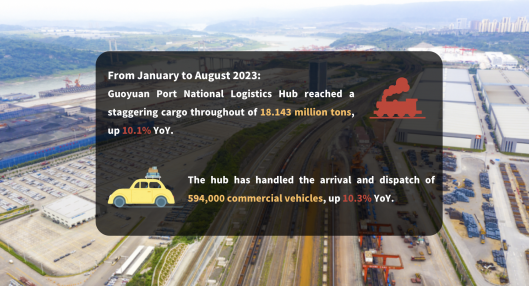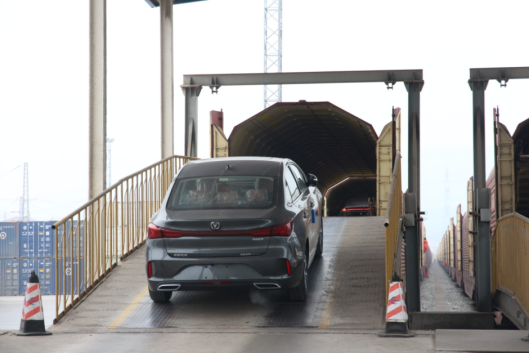
新重庆>
双语资讯
In the first eight months of this year, the Guoyuan Port National Logistics Hub in Chongqing Liangjiang New Area saw significant growth in cargo throughout, reaching 18.143 million tons. This figure marks a 10.1% year-on-year increase, solidifying its role as a crucial trade gateway for China's western region.

The most extensive commercial vehicle logistics base in the southwestern region
Notably, within the logistics hub, the north freight yard at the Yuzui freight station has emerged as the southwestern region's largest commercial vehicle logistics base. It has standardized container operations, facilitating the transportation of automotive parts, engineering machinery, and construction materials.
The Chongqing (Yuzui) commercial vehicle railway transport train (JSQ train) has further amplified the hub's significance. This innovative transport mode allows vehicles to be directly loaded into carriages without requiring racks. Each carriage can accommodate 9 to 10 vehicles, resulting in larger batch shipments, higher loading and unloading efficiency, and lower transportation costs.
Chongqing Customs District has established a green channel for commercial vehicle transport to streamline the process. Companies can complete the necessary customs procedures locally and, upon arrival at the port, directly proceed with customs clearance, reducing operational costs by about 15% and significantly shortening clearance time at the border.
In the first eight months, Guoyuan Port National Logistics Hub handled the arrival and dispatch of 594,000 commercial vehicles, reflecting a 10.3% year-on-year growth, with 332,000 arriving and dispatched from the north freight yard at the Yuzui freight station.

Businesses in western China to international markets
Furthermore, ongoing enhancements to central logistics routes have ensured a continuous flow of goods from Guoyuan Port to global destinations, solidifying its position as a global trade springboard.
On September 1, a new chapter began with a train departure from the south freight yard at the Yuzui station, signifying the addition of a new starting point for the International Land-Sea Trade Corridor (ILSTC) at Guoyuan National Logistics Hub.
This development gives businesses in China's western region a fast track to international markets, particularly in Southeast Asia.
Products like polyester chips produced by Chongqing Wankai New Materials Co., Ltd. are gaining popularity in international markets. As introduced by Yuan Chunjian, General Manager of Chongqing Wankai New Materials Co., Ltd., the company has shipped over 500 TEUs of its new materials via ILSTC, serving markets in Indonesia, Laos, and other ASEAN countries.
"We will leverage the ILSTC to enhance our international competitiveness and promote the deep integration of logistics and industry," said Yuan.
From January to August, Guoyuan Port National Logistics Hub saw a 41.3% year-on-year increase in the number of departures for the ILSTC, totaling 404 trains.
Looking ahead, Guoyuan Port National Logistics Hub aims to maximize its role as a pivotal port hub, further expand external connectivity, enhance its multimodal transport system, and establish an intelligent port, all of which will drive the more profound development of the Chengdu-Chongqing Economic Circle and position it as a crucial supporter for Chongqing's accelerated integration with the Belt and Road Initiative and the Yangtze River Economic Belt.
Guoyuan Port was approved as one of the first national logistics hubs in 2019. Based on the port, Liangjiang strives to participate in the Belt and Road Initiative, the Yangtze River Economic Belt, and the New International Land-Sea Trade Corridor.
(reporting by Dai Yuan,Liangjiang New Area Media Center)